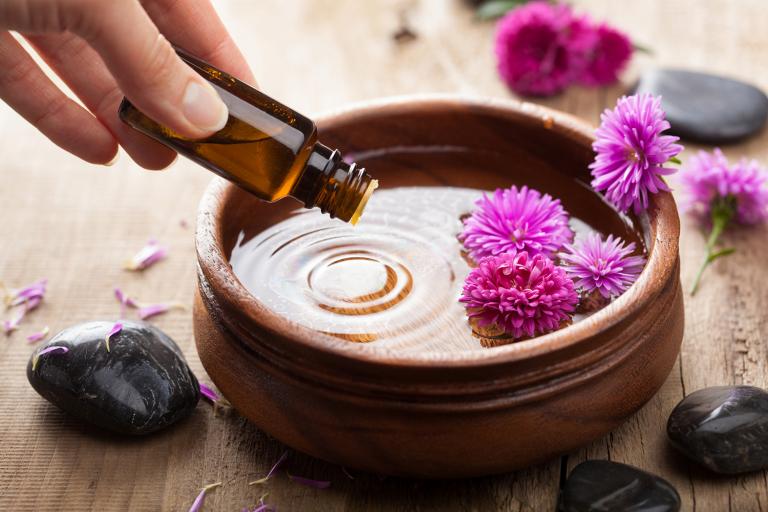Scents are everywhere. When you intentionally turn to them to improve your well-being, you’re practicing what’s called aromatherapy.
What is Aromatherapy?
A form of herbalism, the therapeutic use of fragrance relies on a plant’s oils, which are extracted from the leaves, bark, roots, and seeds. Aromatherapy has been around for thousands of years. Today, plants’ oils are bottled as “essential oils,” and nearly 300 different kinds are available.
Whether in a peaceful lavender-infused bath or a perky peppermint moisturizer, scents relax and refresh, relieve and restore. They also can repel mosquitoes, neutralize body odor, or seduce a lover.
Four Surprising Aromatherapy Facts
Maybe you use aromatherapeutic essential oils regularly. But here are four things about them that might surprise you.
-
Aromatherapy is Backed by Science.
When absorbed through the skin, essential oils enter the bloodstream and affect the nervous and lymphatic systems, among others.
“The molecules of an odor interact with the receptor proteins of cell membranes, thereby creating physiological changes,” such as relaxation or stimulation, says Kurt Schnaubelt, PhD, scientific director of the Pacific Institute of Aromatherapy in San Rafael, CA. Schnaubelt is the author of the forthcoming book The Healing Intelligence of Essential Oils. When you breathe in a scent, neurons in your nasal cavities send messages to your brain, triggering emotions or memories.
-
Caution is Critical When Using Essential Oils.
In their book, Aromatherapy: A Complete Guide to the Healing Art, Kathi Keville and Mindy Green warn: Start with oils made from plants, not synthetics (look for the botanical, or Latin, name on the label). Don’t dab undiluted essential oils directly on your skin; and keep them away from eyes, mouths and children. Use too many drops and the oil may irritate or burn your skin, damage your liver and/or kidneys, or affect your nervous system. If you’re pregnant, elderly, or have serious health problems, see an aromatherapist before trying essential oils.
-
Essential Oil Extraction Matters
The most common way to draw out the oils from plants is steam distillation: Steam from boiling water pulls out the plant’s odor molecules, which then float on top of the water as it cools. It’s also possible to press the oil. Flowers that contain a small amount of oil are sometimes processed using solvents such as petroleum ether, hexane, toluene, and acetone (to name a few). The downside of these chemical solvents is that they can lead to headaches and allergic symptoms; they may even be carcinogenic. According to David Schiller, cofounder of the International Aromatherapy and Herb Association, the best methods are carbon dioxide extraction—a clean and efficient method that uses high pressure and low heat—and steam distillation.
-
Aromatherapy Shifts Your Mood and Attitude
“Aromatherapy can be a great way to change your life for the better, if you open yourself up to it. You have to want to make a positive change,” says Schiller, who is also the coauthor of Aromatherapy for Life Empowerment. Conversely, “If you don’t believe in aromatherapy, you can make it not work for you.”
Certain scents can change the way you perceive and deal with your thoughts and feelings. Aromatherapy also helps you reflect. “Put on some soothing music, rub in the oils, relax, and let them take their course. They’ll help you clear away the noise and lead you to what’s most important to you in your life,” says Schiller.
Whether it’s from a bottle of rosemary essential oil or the rosebush in your own backyard, a sweet fragrance wafts in the world. And maybe, just maybe, that breath takes you somewhere you never expected.

